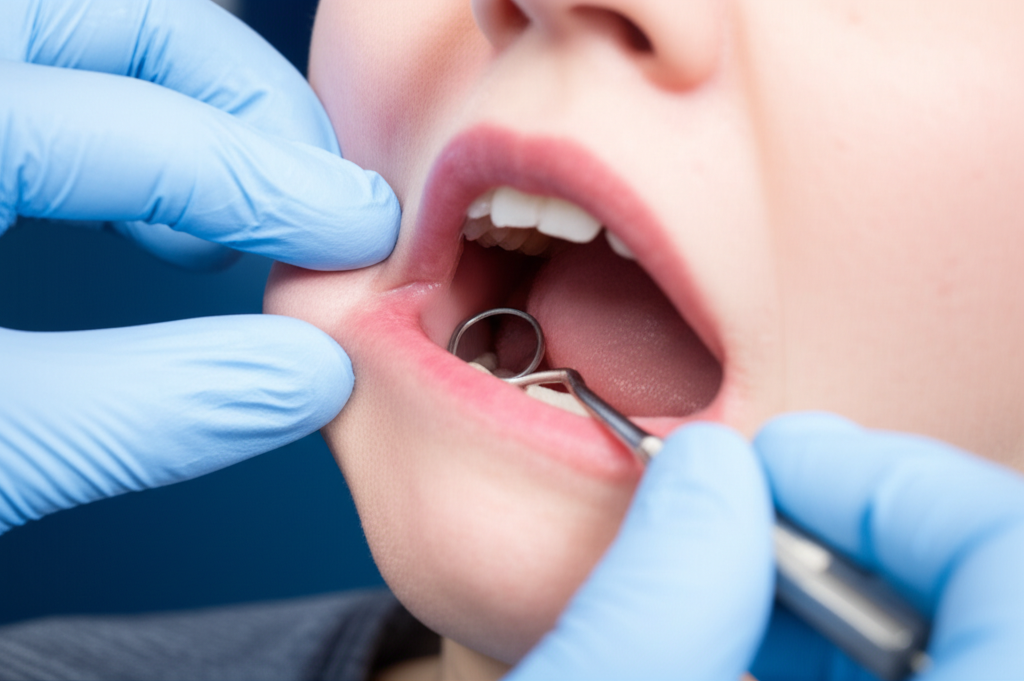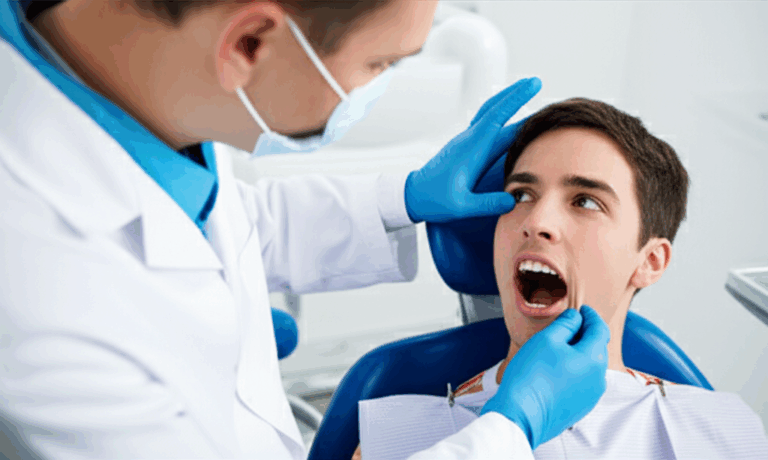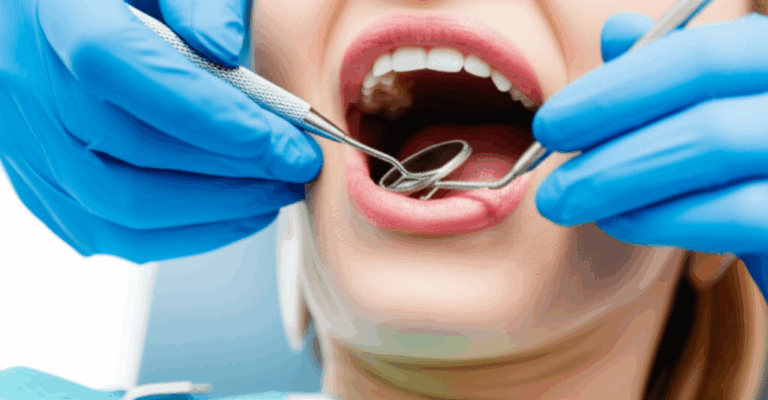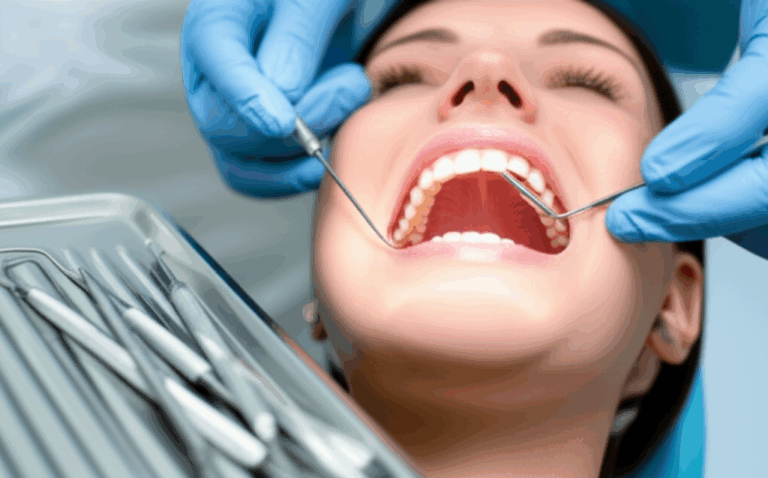
Why Are My Gums Bleeding? A Straightforward Guide to Gum Health
That spot of pink on your toothbrush. Blood when you floss. A metallic taste in your mouth after eating. If your gums bleed, you might wonder: Is this normal? Should I worry? No need to panic—you’re not alone, and you’re in the right place.
Bleeding gums are one of the most common worries people have about their teeth. It can be scary, but it’s not always a big problem. Sometimes, it’s just your mouth’s way of getting your attention. Ignoring it, though, is like turning up your radio when your car’s “check engine” light comes on—not smart.
In this article, we’ll break down why gums bleed, what’s going on in your mouth, simple things you can do at home, when to see your dentist, and how to keep your mouth healthy for life.
What We’ll Cover
Here’s a quick outline of what you’ll find in this guide:
- Why Are My Gums Bleeding? (Is This Normal?)
- What’s Really Happening Inside Your Mouth: The Basic Science of Gums
- Common Causes of Bleeding Gums
- Easy Solutions You Can Try at Home
- When to See a Dentist (And What They’ll Do)
- Who Gets Bleeding Gums? Risk Factors & Who Should Be Careful
- Your Healthy Gum Takeaway: What to Remember and Do Next
Why Are My Gums Bleeding? (Is This Normal?)
Let’s be real—our mouths can seem mysterious. If you see blood on your toothbrush, you might be surprised. Should you be scared? Luckily, the answer is most times no. Bleeding gums are common, and for many people, they’re the first sign that their mouth could use a bit more care.
But just because gum bleeding is common doesn’t mean it’s okay or harmless. Healthy gums should not bleed regularly. Think of it this way: If your skin bled every time you washed your hands, you’d be worried. Give your gums the same attention. Early gum bleeding is your mouth’s way of asking for help. It’s also a warning for something called gum disease, which, if ignored, can turn into a bigger problem.
Does this mean you have a serious dental issue? Not always, but it is a sign to do something. The good news? Most bleeding gums can be stopped or turned around with a few simple changes.
What’s Really Happening Inside Your Mouth: The Basic Science of Gums
Let’s make gums easy to understand—no science degree needed.
Your gums, or gingiva, are like the skin that covers your jawbones and the roots of your teeth. Healthy gums fit tightly around each tooth, keeping out bacteria and bits of food. Below the gumline, your tooth roots are anchored in place, blocking germs from getting into your body.
Gum bleeding starts when this protective barrier gets hurt, usually from swelling or irritation. The main cause is plaque—a soft, sticky layer of bacteria that gathers on your teeth at the gumline. If you skip brushing or flossing, it gets hard and turns into tartar (also called calculus), sort of like cement. When your gums find this buildup, they call in the body’s defense system. Your gums get red, swollen, and yes—bleed—because your immune system is fighting back.
An easy way to understand it:
Imagine your gums as a security guard and plaque as a rowdy crowd. If the crowd stays too long, the guard has to push back, and things get messy.
Short-term swelling is called gingivitis. It’s very common and—good news!—completely fixable if you act fast. Ignore it for too long, and it can turn into periodontitis, which makes your gums pull away, causes bone loss, and may even make teeth fall out.
Common Causes of Bleeding Gums
Not all gum bleeding is the same, and knowing “why” makes it easier to stop. Here are the top causes:
1. Plaque Buildup (Gingivitis)
This is the main reason. If you skip brushing and flossing, your gums will start to react. Bacteria in plaque let off toxins that bother gum tissue, causing swelling (gingivitis) and bleeding when you brush or floss.
What you’ll see: Red, puffy gums that bleed easily. Sometimes bad breath too.
2. Brushing or Flossing Too Roughly
People say, “Brush twice a day!” but if you scrub your teeth and gums like you’re cleaning a dirty dish, you do more harm than good. Hard brushing or rough flossing can hurt your gum tissue and make it bleed.
Tip: Use a soft toothbrush and gentle circles. Think “massage,” not “scrub.”
3. Starting to Floss Again
Picking up flossing after a break? It’s pretty normal to see some bleeding at first, as you clear out old plaque. Keep at it—a week or two of steady flossing usually solves this.
4. Medications
Certain medicines thin your blood (like aspirin or blood thinners), which can make your gums bleed more easily. Some seizure or blood pressure medications can also make your gums grow too much, trapping bacteria and raising your risk of bleeding.
Always tell your dentist about new or changed medicines.
5. Hormone Changes
Being pregnant, on your period, or going through menopause changes your hormone levels. This can make gums more sensitive and easier to bleed (this is often called “pregnancy gingivitis”).
6. Vitamin Shortages
Not getting enough vitamin C or vitamin K can make your gums bleed more. These vitamins are important for healing and helping blood to clot.
7. Smoking or Using Tobacco
Smoking slows down healing and can hide early gum problems, while chewing tobacco hurts gum tissue directly.
8. Poor-Fitting Dental Appliances
Dentures, retainers, or even crowns that don’t fit right can rub your gums and cause them to hurt or bleed.
9. Other Health Problems
Sometimes, bleeding gums can be a sign of something deeper, like diabetes, blood problems (like leukemia), or some infections.
Easy Solutions You Can Try at Home
You’ve found the problem—so what now? The best fix depends on what’s causing the bleeding, but most people can handle mild gum bleeding themselves, especially if it just started.
Great Daily Habits—Your Best First Step
- Brush twice a day with a soft toothbrush. Gentle is better. Think of cleaning a silk shirt, not scrubbing a frying pan.
- Floss once every day. Yes, every day! This breaks up hidden plaque. If your gums bleed at first, don’t give up—in a week or two, most bleeding will stop as gums get healthier.
- Use fluoride toothpaste. This makes your teeth stronger and helps your whole mouth.
- Try a saltwater rinse. Mix a teaspoon of salt in a cup of warm water. Swish it gently to lower swelling and bacteria.
Tools to Make Things Easier
- Try an electric toothbrush with a light or beep if you press too hard.
- Water flossers are a gentle way to clean between teeth, especially if your gums are sore or you have braces.
Diet Can Help
- Eat foods high in vitamin C (like oranges, peppers, and strawberries) and vitamin K (like green vegetables and broccoli).
- Drink more water. Spit helps wash away germs and crumbs—if your mouth is dry, you’ll get more gum problems.
Things to Avoid
- Stay away from mouthwashes with alcohol. These can dry your gums and make them worse.
- Don’t smoke or use tobacco. Your gums (and the rest of you) will thank you.
Are Store-Bought Products Helpful?
Some mouthwashes and toothpastes say they stop gum problems. Look for ones with the ADA Seal. These can help, but nothing beats good daily brushing and flossing.
How Long Should You Wait?
Most small gum bleeding gets better in a week or two with good habits. If not—or if it gets worse—it’s time to call your dentist.
When to See a Dentist (And What They’ll Do)
Sometimes, what you do at home isn’t enough. Here’s when to make an appointment:
- Bleeding doesn’t get better in two weeks of daily brushing and flossing.
- You see other problems: gums pulling away from teeth, bad breath that won’t go away, pus, loose teeth, or your bite changes.
- You notice bleeding for no reason, or bleeding after dental work.
- You have health issues (like diabetes) or take blood thinners, which make gum troubles harder.
What Will the Dentist Do?
- Look closely at your gums and teeth.
- Check for “pockets” around teeth, an early sign of gum disease.
- See if you have tartar buildup.
- Talk with you about your health and any meds you take.
The dentist might:
- Do a professional cleaning to get rid of tartar and plaque.
- Do deep cleaning (scaling and root planing) under the gums if gum disease has started.
- Give you strong mouthwash or toothpaste to fight germs and swelling.
In worse cases, you may need a gum specialist called a periodontist. If you need replacements like crowns, bridges, or dental implants, getting them made by a good implant dental laboratory or crown and bridge lab helps prevent gum irritation. Your dental team will help you decide what’s best.
Who Gets Bleeding Gums? Risk Factors and Who Should Be Careful
Not everyone has the same chance for gum problems. Knowing your risks helps you stay ahead.
You have higher risk if you:
- Don’t brush or floss every day.
- Smoke or use any kind of tobacco.
- Are pregnant, going through menopause, or have other hormone shifts.
- Have diabetes or long-term health problems.
- Take some medicines that hurt gum tissue.
- Have family members with gum disease.
Dental pieces—like dentures or retainers—that don’t fit well can cause gum troubles too. If you wear these, getting help from a removable denture lab or a lab that makes custom retainers does help.
Who should never ignore bleeding gums?
- Kids (because bleeding is rare, but bad habits can start early).
- People with weak immune systems, pregnant women, or anyone getting chemotherapy.
If you’re not sure, play it safe and ask your dentist. Better to be safe than sorry.
Your Healthy Gum Takeaway: What to Remember and Do Next
Here’s what matters most:
Big Things to Remember:
- Sometimes gum bleeding happens, but it’s not normal—it’s your mouth’s way of asking for help!
- Most bleeding gums are from not cleaning well. Better daily habits can stop it.
- Brush gently, floss daily, and use better tools if you want.
- Eating more fruits and greens helps gums too.
- If bleeding lasts more than two weeks or gets worse, see your dentist.
- Most dental problems, not just bleeding gums, are easier—and cheaper—to fix early.
Simple Next Steps:
Ready to take care of your gums?
Book a dental visit if you haven’t had one this year. Tell your dentist about new health issues, prescriptions, or dental pieces. For more info about custom dental solutions, check out what a china dental lab offers, or ask your dentist for advice just for you.
A confident smile needs healthy gums. Even small changes make a big difference—so start today, listen to your gums, and get your healthiest smile yet.
References:
- American Dental Association. (n.d.). Gum Disease. https://www.ada.org/resources/research/science-and-research-institute/oral-health-topics/gum-disease
- Centers for Disease Control and Prevention. (n.d.). Oral Health Conditions. https://www.cdc.gov/oralhealth/conditions/index.html
Remember: You aren’t just cleaning your teeth—you’re looking after the base for your whole health. If you have questions or want to know your options, reach out to your dentist—they’re always ready to help.








